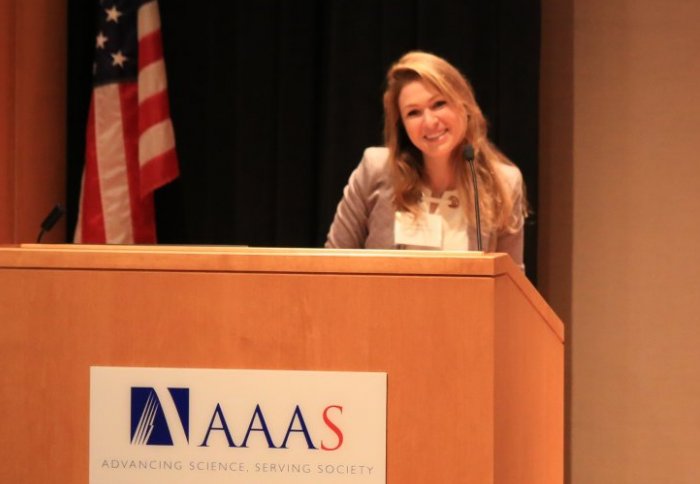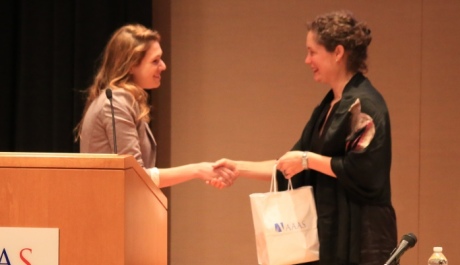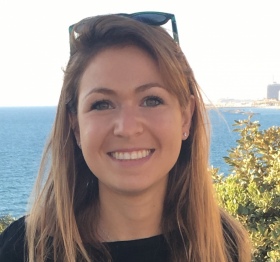Debate on fracking explored in PhD student's award-winning essay

Miriam Aczel accepts her AAAS essay award (Pic: AAAS/Jonathan Drake)
An Imperial PhD student's essay on the human rights impact of fracking has won an international award.
Miriam Aczel, a PhD researcher and President’s Scholar at the College’s Centre for Environmental Policy, won the Graduate Student category of the American Association for the Advancement of Science’s (AAAS) Science and Human Rights Coalition student essay competition.
She collected her award at the Coalition’s annual meeting held at the AAAS headquarters in Washington DC late last month. Her winning essay, “Fracking and Human Rights: Using a Rights-Based Framework to Regulate a New Technology,” was selected by a panel of judges.
Sixty-six students from 32 different countries entered the competition’s undergraduate and graduate categories, each writing on a subject matter positioned at the intersection of science, technology and human rights. Topics explored in the submitted essays included reproductive technologies, food security, artificial intelligence, data privacy, and access to water.
Karen Makuch, lecturer in Environmental Law & Energy Law, and Miriam’s PhD supervisor, said she and the Imperial Centre were “delighted that Miriam has been honoured with this prestigious award”.
She said: "Her work on the application of human rights arguments to scientific and technological issues is central to the development of, and related progress, in this field."
Exploring the fracking debate
Miriam Aczel’s research focus is on the international regulation of shale gas extraction, and environmental and public health impacts of hydraulic fracturing in the USA, UK, EU and China. She recently spent time as a visiting researcher at the Environmental Law Institute in Washington DC and is currently conducting research at Massachusetts Institute of Technology (MIT) this summer.
Her winning essay explored the environmental and health impacts of fracking – a process of extracting oil and gas from shale rock. The process has attracted debate and controversy in recent years, with concerns being raised over its reported links to negative environmental and health impacts.

Miriam accepts her award (Pic: AAAS/Jonathan Drake)
Miriam’s essay delved into two sides of the fracking debate, balancing an exploration of the human right to water, a clean environment, and health, with a look into the human right to energy.
Speaking of the award, she said she was “incredibly honored” to have been selected, and that the recognition was motivating her to conduct further research into the subject. She spoke to Andrew Youngson further about the award and her research in general.
Why is this competition and award important?
The development of new technologies, particularly extractive technologies with the potential for impacts on the environment, public health, and quality of life, means we need to understand the potential impacts of these activities on basic human rights.
Competitions such as this encourage students to think about the possible effects of technology on human rights, as well as ways technology can safeguard or protect human rights. Encouraging students to think about this complex two-way relationship is an important step towards more ethical scientific research and technology, as well as a way for students to learn more about the important mission of the Coalition and AAAS, and how they can contribute.
What research are you conducting at MIT this summer?
I am currently on a research visit to MIT’s Environmental Solutions Initiative. My PhD research examines how the UK can improve the regulatory framework governing hydraulic fracturing. I am studying the more extensive US experience with fracking to identify gaps in the regulation and draw analogies so that the UK can better protect the environment and public health. MIT’s scientific and technical expertise and data is helpful in developing better understanding of the US’s experience, and the lessons learned that can help strengthen the UK’s regulatory policies.
What drew you to your PhD’s specific field of research?
My research looks at the scientific data on impacts on the environment and health from shale gas extraction processes, and the mechanisms and legal remedies for evaluating these impacts.
The debate around fracking is contentious, with the UK about to start commercial extraction of shale gas using fracking, and I became interested in researching how the UK could learn from the experience of the US and other countries, in order to positively engage local communities, improve the regulatory framework, and minimize environmental and health impacts.
There is so much debate in the media and in politics about environmental policy. What’s your advice for cutting through the noise to get to the facts?
 I think the most important thing is asking questions of as many people as possible. My research has included extensive interviews and site visits with people on both side of the ‘fracking debate’, but it is important to always critically analyze any data and statements and examine the differing opinions in order to get the facts.
I think the most important thing is asking questions of as many people as possible. My research has included extensive interviews and site visits with people on both side of the ‘fracking debate’, but it is important to always critically analyze any data and statements and examine the differing opinions in order to get the facts.
Also, I think the opportunity to conduct your own research is the best way to get the facts. Citizen science or crowd science projects, which can involve anyone including children, are a fun and exciting way of examining scientific issues such as climate change, pollution, or changes in animal migratory patterns and can help bring context to political and media debates.
What’s next for you?
This summer I have participated in two summer schools—one on global climate change and energy together with students from Tsinghua University in Beijing, and the second on social science for advancing energy policy, in Lyon, France, funded through an EU Horizon 2020 grant. I plan to extend on the work done over the summer schools with research visits to Tsinghua University and University of Lyon.
I am about to participate in the Roche Continents program, which brings together 100 arts and science students from across Europe to explore the common ground between science and the arts, all in the context of the Salzburg Festival.
Article text (excluding photos or graphics) © Imperial College London.
Photos and graphics subject to third party copyright used with permission or © Imperial College London.
Reporter
Andrew Youngson
Communications Division